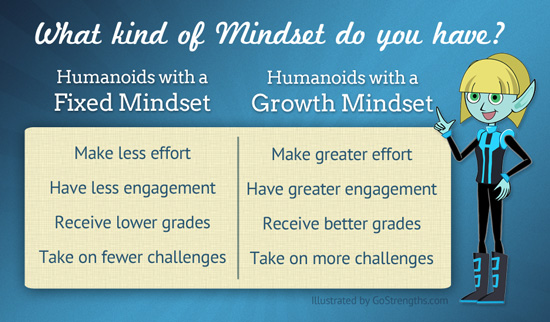Welcome to your second sample lesson on mindsets! Below, you’ll find a scientific explanation about mindsets brought to you by one of our popular characters, ScienceGuy! These explanations are appreciated by students at levels as young as third grade, all the way through to high school. Next, you’ll find an example of mindsets in action. Finally, you’ll see Neutrino providing a GoTool! or specially powered tool to help students “blast away” their fixed mindsets. In the the full program, students learn several concrete methods to overcome fixed mindsets and teachers learn how to cultivate growth mindsets in their students within the teacher training modules!
1. Mindsets explained by ScienceGuy
Key Learning Points!
- Let’s recap Fixed versus Growth mindsets:
- Fixed mindset humanoids believe that they are born with a certain amount of intelligence and talent and this doesn’t change much over your life. You’re stuck with the cards you’re dealt.
- Growth mindset humanoids believe that intelligence and talent can be increased and changed with life experience. You’re not stuck with the cards you’re dealt.
- What you BELIEVE is true affects the decisions you make and challenges you take on.
- Fixed mindset humanoids make less effort and take on fewer challenges.
- Growth mindset individuals make more effort and take on more challenges.
- Of course, you want to have a growth mindset. Below, you will learn how you can begin to develop a growth mindset.

2. Mindsets in Action at School
Key Learning Points!
- In this scene, which youthling has a growth mindset and which youthling has a fixed mindset?
- If you guessed that Nelly has the fixed mindset, you are right! She is scared to answer a question in class even though she is confident she knows the answer. Unfortunately, her fixed mindset has slapped a label over her head which says that she is “smart.” Nelly feels that if she gets the answer wrong, no one will think she’s smart anymore and she’ll lose her label.
- Sabrina has a growth mindset. She knows answering the question is an opportunity to learn. She’s not scared to try because she doesn’t think answering incorrectly means she is any less intelligent.
3. Neutrino’s GoGrowth! GoTool!
Key Learning Points!
- GoGrowth! helps get rid of unwanted labels.
- GoGrowth! helps to develop a growth mindset by helping you focus on the process of what you’re doing instead of just the end result.
- Remember, when you have an opportunity (e.g. to try out for a school team, to answer a question in class, etc.), the way you look at the opportunity is a choice.
- Choice 1: Do not take the opportunity because you are scared to lose your label (Fixed Mindset).
- Choice 2: Take the opportunity because you know that trying something is a learning experience (Growth Mindset).
- You can always choose to have a growth mindset.
- When you come across your next exciting challenge, make a list of what a fixed mindset attitude would think about it versus what a growth mindset attitude would think.
- Choose to have a growth mindset, as it is a choice!
Academic References
References
- Dweck, C. S. (1999). Caution-praise can be dangerous. American Educator, 23(1), 4-9.
- Dweck, C. (2002). Messages that motivate: How praise molds students’ beliefs, motivation, and performance (in surprising ways). In J. Aronson (Ed.), Improving Academic Achievement: Impact of Psychological Factors on Education (Educational Psychology), (pp. 37-60). San Diego, CA, US: Academic Press.
- Dweck, C. (2007). Mindset: The New Psychology of Success. New York: Ballantine Books.